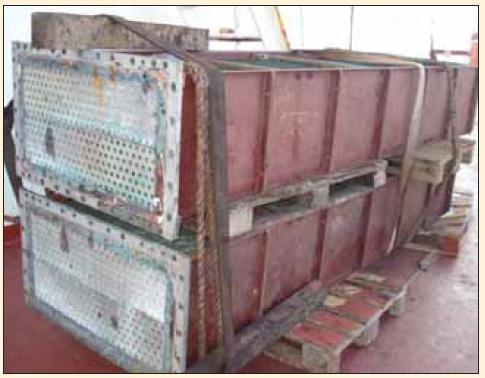200814 Propeller damaged by own refuse
A cargo ship had recently renewed some heavy heat exchangers in the machinery spaces and the discarded units were retained for dumping in deep and open waters. They were temporarily stowed on the poop deck. During passage on the high seas, without the knowledge of the bridge watch and with the ship steaming ahead at full sea speed, the units were transferred on to an improvised 'skid' placed on top of pipe lengths laid on deck and were 'rolled' overboard. This involved temporary removal (gas cutting and re-welding) of sections of poop deck railing. The point of jettison was only about 20 metres ahead of the propeller. At the next port, the vessel underwent a routine underwater hull coating inspection and the divers reported damage to the propeller blades.

Heat exchangers on the poop deck before unauthorised dumping
As well as floating debris, the indiscriminate dumping of large and heavy objects from near the stern can easily damage the propeller and rudder, as the trajectory under the water may be affected by the suction effect of the propeller. If the damage is serious, the vessel may be disabled far from SAR (search and rescue) services, with serious consequences for life, property and the environment.
FEEDBACK - August 2008
I'm somewhat surprised that this report has been issued without any comment. Surely, there is some convention which precludes dumping waste of this sort at sea? Even if there isn't, I would imagine the company's environmental policy might (should?) preclude this sort of action. In any event, the report tries to give advice but actually demonstrates what a reckless operation took place, without any safe management. Amazing.
Editor's note: Marpol does not specifically address discarded ship's spares under its annexes, but such refuse may reasonably be considered as 'operational waste' under Annex V (Garbage), provided they do not contain or are not 'contaminated' with substances that come under any of the other Annexes: oil, noxious liquid substances (NLS), harmful substances, sewage and environmentally damaging substances. The dumping of the discarded heat exchangers on the 'high seas' in this case did not contravene Marpol if it was done more than 25 miles from nearest land outside special areas. However, lack of seamanship, prudence and internal communications seem to have been the main reasons for the damage sustained by the propeller.
